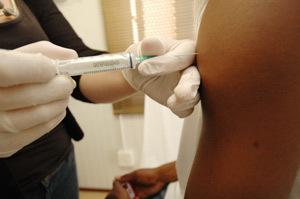First human trial of UCT's HIV vaccine
18 May 2009 | Story by Newsroom
World AIDS Vaccine Day, May 18, marks the occasion in 1997 when US President Bill Clinton challenged researchers to come up with an AIDS vaccine within the following decade, stating that such a vaccine was the only way to eliminate the threat of AIDS. Twelve years later, the goal of an effective HIV vaccine remains, said the International AIDS Vaccine Initiative in a press release, "unfulfilled". But the work being conducted around the globe, including at UCT, shows that scientists are persevering.
Researchers from UCT's Institute of Infectious Disease and Molecular Medicine (IIDMM) have announced that their two new preventative HIV vaccines have reached the first stage of human clinical trials, a first for Africa.
This trial, called SAAVI 102/HVTN 073, is also a milestone for South Africa. The country is one of the few developing nations to have developed an HIV vaccine and progressed it into human clinical trials.
Professor Anna-Lise Williamson is leader of the team at the IIDMM.
The Desmond Tutu HIV Centre, based at the IIDMM, is one of three sites in the world that will conduct the trials. The others sites are in Johannesburg and Boston in the US.
These vaccines are a culmination of eight years of research by scientists at the IIDMM, UCT, and collaborators from the US National Institutes of Health and the Vaccine Research Centre. Their development and testing has been underpinned by funding from the South African AIDS Vaccine Initiative (SAAVI) and the US National Institute of Allergy and Infectious Diseases (NIAID).
"There is still a long way to go before we will know if these products will be successful in preventing HIV infection," said SAAVI's interim director, Elise Levendal.
The initial human trial is being conducted jointly with the HIV Vaccine Trials Network and the NIAID, part of the US National Institutes of Health.
 This work is licensed under a Creative Commons Attribution-NoDerivatives 4.0 International License.
This work is licensed under a Creative Commons Attribution-NoDerivatives 4.0 International License.
Please view the republishing articles page for more information.










